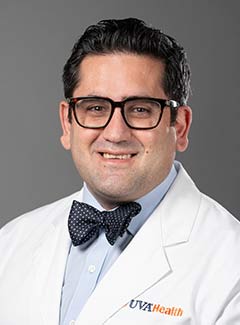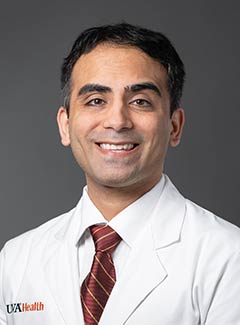UVA Nephrology Lynchburg opened this August to provide patients in Lynchburg and the surrounding areas convenient access to kidney care classified as “high-performing” by U.S. News & World Report. This new clinic is located in the same building as UVA Dialysis Lynchburg. It will be staffed by two new board-certified nephrologists who specialize in general nephrology, and treat a broad range of conditions, including hematuria, electrolyte and acid-based disorders, kidney failure, glomerulonephritis and vasculitis and more. Learn more about the providers, their backgrounds and expertise below.
Get to Know: Hanna Zaraket, MD
Title: Assistant Professor
Medical School: Universite Sant-Joseph-Faculte de Medecine, Beirut
Residency: Staten Island University Hospital
Fellowships: Staten Island University Hospital
Where did you complete your medical training?
I was born in Lebanon and I went to med school in Beirut before coming to the U.S. for my residency. I did my residency and my nephrology fellowship at Staten Island University Hospital in New York. My sister also did her medical training there with me. She is a GI specialist. My uncle was in the U.S. first; he paved the way for us. He has been an internist in South Carolina and Georgia for more than 20 years. I also have many cousins who are physicians in multiple specialties practicing in Europe mostly.
Why did you choose to specialize in nephrology?
Many of the most impressive physicians I met during my training were nephrologists, from my physiology teacher back home to the nephrologists in Staten Island and the doctors here at UVA. Nephrology is a combination of clinical expertise and science. It’s not like you can have enough clinical practice and be fine. You have to understand the science – the physiology and physiopathology. And I love math and chemistry. This is why I chose nephrology as my specialty.
What attracted you to UVA?
This was a great opportunity for me to grow professionally as a doctor, to be part of a very well-integrated, coordinated system where the best care will be given to the patient. So first, it was the patient-centered approach that attracted me. It’s more organized than private practice. Also, the amount of expertise in the Department of Nephrology. UVA is a leader in the field and well known nationwide. The [leaders] in the department – Dr. Rosner, Dr. Okusa and Dr. Abdul Rahman – are all very impressive. No matter where you are, you know about them. UVA has a long history of education and expertise in the field of nephrology, so the university is invested in this department.
Why do you feel it was important to launch this new nephrology clinic in Lynchburg?
There are many patients with diabetes, hypertension and chronic kidney disease who travel from Lynchburg to UVA to get kidney care. Now we can deliver quality care close to home so patients don’t have to travel. They can receive integrated service because it’s all one UVA system.
What is your clinical specialty?
I am a general nephrologist, but my primary interests include acid-based disturbances and electrolyte disorders like hyponatremia. I will also be the Medical Director of UVA Dialysis Lynchburg.
How would you describe your approach to patient care?
We have an interdisciplinary approach to care where we take care of the patient as a whole. We are a specialized clinic, but we address other issues as well like medications that need to be adjusted because of a kidney issue, communication with the primary care team, the patient and family to make sure everyone is aware of the care plan. This allows us to achieve the goals of care rather than just addressing one issue or one number. Many patients need this kind of globalistic plan and multidisciplinary approach. My colleague, Dr. Memon, will work with me to deliver the best care to patients in clinic. We will also be consulting with inpatients at Virginia Baptist Hospital, Lynchburg General Hospital and at UVA.
Get to Know: Waqas Memon, MD
Title: Assistant Professor
Medical School: Liaquat University of Medical and Health Sciences, Pakistan
Residency: Carle Foundation Hospital, Internal Medicine
Fellowships: Virginia Commonwealth University, Internal Medicine: Nephrology
Why did you decide to attend medical school outside of the U.S.?
My family and I came to the United States from Pakistan when I was four. I decided I wanted to become a doctor at an early age, however the decision to go to medical school outside the U.S. was because of an experience I had when I was in high school. I volunteered at a free clinic in Pakistan where we worked in an underserved area. The majority of the population had never received medical care in the past. I felt like I was helping them and making a difference. This experience led me to stay there for medical school. The journey was astounding, with an initial culture shock, but later turned into an experience of a lifetime.
How did your role as Chief Fellow at VCU impact your approach to patient care?
Our program had four clinical nephrology fellows per year and two transplant fellows, with ten fellows total. The chief fellow was responsible for teaching during monthly conferences, arranging a pathology conference and some administrative tasks. What helped me most in this role was developing techniques on teaching, which is obviously an art. It takes time to learn how to explain topics, and I think that’s what that role taught me: how best to educate both trainees and patients.
What appealed to you about this role at the new UVA Nephrology Lynchburg clinic?
I recently finished my fellowship at VCU. When I applied for jobs, this was a job that stood out because it is a hybrid type of practice. To have the opportunity to work in clinical practice, but also have an academic role as well — I had heard from all of my mentors that this type of job is rare. I got the best of both worlds. This, coupled with working at a world-class institution and learning from leaders in the field of nephrology, was a tremendous opportunity.
What else is unique about this new clinic in terms of patient care?
I believe Lynchburg is an area with many kidney disease patients. Most of these patients need the care of a nephrologist. Our clinic offers a unique practice, as we all work so closely with our colleagues in Charlottesville. We manage a wide variety of pathologies, including hematuria, hypercalcemia, hyponatremia, glomerulonephritis, kidney infections, kidney stones, kidney failure, nephrotic and nephritic syndromes, polycystic kidney disease, electrolyte abnormalities — any condition of the kidneys, we will take care of.
What do you enjoy most about the field of nephrology?
In medical school, I always felt nephrology was a complex field, however I was fortunate to have an excellent mentor who helped me along the way. I believe nephrology is unparalleled in the way we deal with medicine as a whole. It interweaves every organ system. It also has a superb mix of inpatient and outpatient care, with challenging diagnoses along the way. We look after the critically ill and provide chronic care, so we have the ability to establish long-term relationships with patients.

